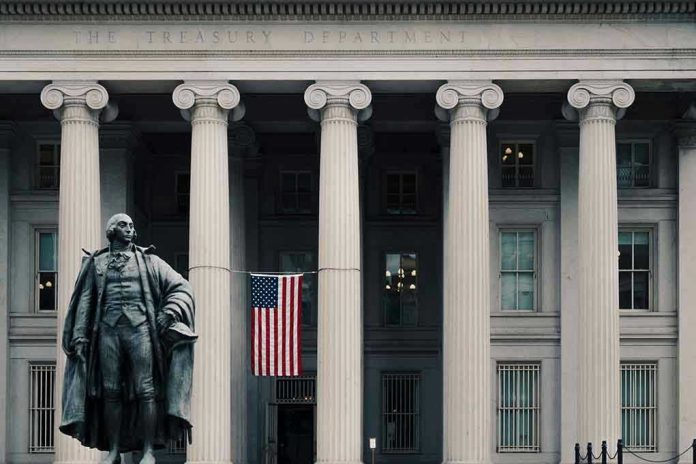
When the U.S. Treasury Secretary tells America’s biggest city to “drop dead” if it elects a socialist mayor, the warning isn’t just historical theater—it’s an ultimatum that could reshape not just New York, but the rules of rescue for every city in America.
Story Snapshot
- Treasury Secretary Scott Bessent publicly vows no federal bailout for NYC if Zohran Mamdani becomes mayor and enacts his progressive agenda.
- Wall Street and business titans threaten to bankroll opposition, fearing a mass exodus of jobs and capital.
- The phrase “drop dead” revives memories of NYC’s 1975 fiscal crisis—rekindling fierce debate over federal intervention and local autonomy.
- The stakes: Will progressive urban policy hit a financial wall, or will NYC voters double down on a leftward turn?
Treasury Secretary’s Ultimatum to New York City
U.S. Treasury Secretary Scott Bessent delivered a message to New York City that echoed across the country: If Zohran Mamdani, a Democratic socialist, wins the mayoralty and enacts his platform, there will be no federal bailout. Bessent’s televised “drop dead” warning, a deliberate callback to President Ford’s infamous 1975 rebuke, was aimed squarely at a city teetering on the edge of fiscal uncertainty. Unlike Ford’s era, Bessent’s threat comes during a time when the city’s tax base is already shrinking, and the wounds of pandemic-era spending still fester.
Bessent’s words landed like a thunderclap, not just in City Hall but on Wall Street, where hedge fund manager Bill Ackman and fellow finance heavyweights quickly vowed to pour resources into defeating Mamdani. The message: If New York takes a hard-left turn, its business class will vote with its feet.
The Progressive Gamble: What Mamdani’s Platform Means
Zohran Mamdani’s campaign, buoyed by endorsements from Bernie Sanders and Alexandria Ocasio-Cortez, offers a vision of New York transformed: expansive social programs, sharply higher taxes on the wealthy, and aggressive intervention to address affordability and inequality. His victory in the Democratic primary was a shock to the city’s establishment. Now, with the general election looming, Mamdani’s platform dominates headlines and divides the city’s electorate along stark ideological lines.
Business leaders warn that Mamdani’s approach will accelerate the flight of high earners and corporations to lower-tax states, further eroding the city’s fragile revenue base. Advocates for Mamdani counter that only bold policies can reverse decades of deepening inequality and unaffordable housing, betting that a new social contract can revitalize the city without federal support. The absence of a public response from Mamdani’s campaign only heightens the sense of unpredictability.
Wall Street vs. City Hall: The Battle for New York’s Future
Wall Street’s reaction to Bessent’s warning was swift and severe. Bill Ackman, never one for understatement, declared that Mamdani’s plan would “destroy jobs and cause businesses and wealthy taxpayers to leave New York.” Other business leaders echoed the alarm, signaling a readiness to back any candidate—even a moderate Democrat or Republican—who could stop the city’s leftward slide. The specter of capital flight looms large, with financial firms and tech companies quietly accelerating contingency plans for relocation.
Behind the scenes, campaign donations, negative advertising, and public statements are transforming the mayoral race into a proxy war over the future of American urban policy. The city’s residents, particularly renters and small business owners, face a wrenching choice: embrace the promise of expanded services and a renewed social safety net, or fear the specter of declining services and a shrinking economy if the financial math doesn’t add up.
Echoes of 1975: Why “Drop Dead” Still Haunts New York
The phrase “drop dead” isn’t just rhetorical drama; it’s a loaded threat. In 1975, President Ford’s refusal to bail out New York City nearly pushed the city into bankruptcy, only for a last-minute deal to stave off default. The scars of that crisis never fully healed. Today, Bessent’s invocation of the same words is a warning shot not just to New York, but to any city tempted by aggressive progressive reforms without a federal safety net.
Nationally, the showdown in New York has become a litmus test—can progressive economics survive when Washington refuses to backstop the risks? Fiscal conservatives praise Bessent’s move as overdue discipline for municipal profligacy. Progressives decry it as federal overreach and a naked threat to local democracy. For New Yorkers, and for city leaders across America, the answer will determine not just who leads the nation’s largest city, but whether Washington’s “drop dead” is a warning or a dare.
Sources:
Fox Business: Treasury’s Bessent warns NYC: No bailout under Mamdani – ‘drop dead’
Fox News: Progressive NYC mayor candidate Mamdani gains traction, plans massive spending increases
Fox Business: Scott Bessent profile and related coverage
Silverloch: Treasury Secretary Bessent has blunt warning if NYC elects Mamdani



